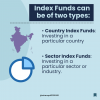An Index Fund is a mutual fund that tracks the performance of an underlying index like SENSEX, NIFTY 50, etc. The fund manager tries to replicate the returns offered by the index without straying away too much. On the other hand, an Exchange Traded Fund or ETF is also a mutual fund that tracks an underlying index. So, what is the difference between the two?
An index fund has a fund manager who creates a portfolio of securities that replicates a stock market index. You can buy and sell units of an index fund only at the NAV at the end of the day. An ETF also has a fund manager who creates a portfolio of securities replicating an underlying index. However, you can buy and sell units of an ETF at any time during the day. ETFs are listed on stock exchanges and have a market price determined by their demand and supply. There are various types of ETFs available that track different types of indices.
The expense ratio of an ETF is usually lower than that of an index fund. Also, the tracking error of an ETF is usually lower than an index fund too. Index funds allow you to do a SIP, whereas an ETF needs a lumpsum investment. Both ETFs and index funds are excellent options for investors looking for a passive investment avenue.
An index fund has a fund manager who creates a portfolio of securities that replicates a stock market index. You can buy and sell units of an index fund only at the NAV at the end of the day. An ETF also has a fund manager who creates a portfolio of securities replicating an underlying index. However, you can buy and sell units of an ETF at any time during the day. ETFs are listed on stock exchanges and have a market price determined by their demand and supply. There are various types of ETFs available that track different types of indices.
The expense ratio of an ETF is usually lower than that of an index fund. Also, the tracking error of an ETF is usually lower than an index fund too. Index funds allow you to do a SIP, whereas an ETF needs a lumpsum investment. Both ETFs and index funds are excellent options for investors looking for a passive investment avenue.













